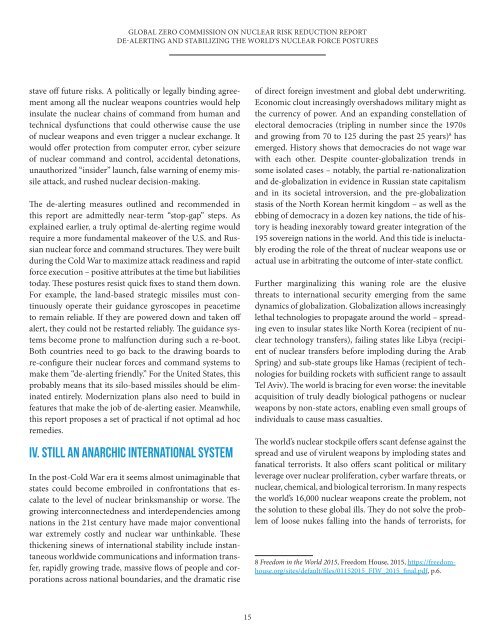global_zero_commission_on_nuclear_risk_reduction_report
global_zero_commission_on_nuclear_risk_reduction_report
global_zero_commission_on_nuclear_risk_reduction_report
Create successful ePaper yourself
Turn your PDF publications into a flip-book with our unique Google optimized e-Paper software.
GLOBAL ZERO COMMISSION ON NUCLEAR RISK REDUCTION REPORTDE-ALERTING AND STABILIZING THE WORLD’S NUCLEAR FORCE POSTURESstave off future <strong>risk</strong>s. A politically or legally binding agreementam<strong>on</strong>g all the <strong>nuclear</strong> weap<strong>on</strong>s countries would helpinsulate the <strong>nuclear</strong> chains of command from human andtechnical dysfuncti<strong>on</strong>s that could otherwise cause the useof <strong>nuclear</strong> weap<strong>on</strong>s and even trigger a <strong>nuclear</strong> exchange. Itwould offer protecti<strong>on</strong> from computer error, cyber seizureof <strong>nuclear</strong> command and c<strong>on</strong>trol, accidental det<strong>on</strong>ati<strong>on</strong>s,unauthorized “insider” launch, false warning of enemy missileattack, and rushed <strong>nuclear</strong> decisi<strong>on</strong>-making.The de-alerting measures outlined and recommended inthis <strong>report</strong> are admittedly near-term “stop-gap” steps. Asexplained earlier, a truly optimal de-alerting regime wouldrequire a more fundamental makeover of the U.S. and Russian<strong>nuclear</strong> force and command structures. They were builtduring the Cold War to maximize attack readiness and rapidforce executi<strong>on</strong> – positive attributes at the time but liabilitiestoday. These postures resist quick fixes to stand them down.For example, the land-based strategic missiles must c<strong>on</strong>tinuouslyoperate their guidance gyroscopes in peacetimeto remain reliable. If they are powered down and taken offalert, they could not be restarted reliably. The guidance systemsbecome pr<strong>on</strong>e to malfuncti<strong>on</strong> during such a re-boot.Both countries need to go back to the drawing boards tore-c<strong>on</strong>figure their <strong>nuclear</strong> forces and command systems tomake them “de-alerting friendly.” For the United States, thisprobably means that its silo-based missiles should be eliminatedentirely. Modernizati<strong>on</strong> plans also need to build infeatures that make the job of de-alerting easier. Meanwhile,this <strong>report</strong> proposes a set of practical if not optimal ad hocremedies.IV. STILL AN ANARCHIC INTERNATIONAL SYSTEMIn the post-Cold War era it seems almost unimaginable thatstates could become embroiled in c<strong>on</strong>fr<strong>on</strong>tati<strong>on</strong>s that escalateto the level of <strong>nuclear</strong> brinksmanship or worse. Thegrowing interc<strong>on</strong>nectedness and interdependencies am<strong>on</strong>gnati<strong>on</strong>s in the 21st century have made major c<strong>on</strong>venti<strong>on</strong>alwar extremely costly and <strong>nuclear</strong> war unthinkable. Thesethickening sinews of internati<strong>on</strong>al stability include instantaneousworldwide communicati<strong>on</strong>s and informati<strong>on</strong> transfer,rapidly growing trade, massive flows of people and corporati<strong>on</strong>sacross nati<strong>on</strong>al boundaries, and the dramatic riseof direct foreign investment and <str<strong>on</strong>g>global</str<strong>on</strong>g> debt underwriting.Ec<strong>on</strong>omic clout increasingly overshadows military might asthe currency of power. And an expanding c<strong>on</strong>stellati<strong>on</strong> ofelectoral democracies (tripling in number since the 1970sand growing from 70 to 125 during the past 25 years) 8 hasemerged. History shows that democracies do not wage warwith each other. Despite counter-<str<strong>on</strong>g>global</str<strong>on</strong>g>izati<strong>on</strong> trends insome isolated cases – notably, the partial re-nati<strong>on</strong>alizati<strong>on</strong>and de-<str<strong>on</strong>g>global</str<strong>on</strong>g>izati<strong>on</strong> in evidence in Russian state capitalismand in its societal introversi<strong>on</strong>, and the pre-<str<strong>on</strong>g>global</str<strong>on</strong>g>izati<strong>on</strong>stasis of the North Korean hermit kingdom – as well as theebbing of democracy in a dozen key nati<strong>on</strong>s, the tide of historyis heading inexorably toward greater integrati<strong>on</strong> of the195 sovereign nati<strong>on</strong>s in the world. And this tide is ineluctablyeroding the role of the threat of <strong>nuclear</strong> weap<strong>on</strong>s use oractual use in arbitrating the outcome of inter-state c<strong>on</strong>flict.Further marginalizing this waning role are the elusivethreats to internati<strong>on</strong>al security emerging from the samedynamics of <str<strong>on</strong>g>global</str<strong>on</strong>g>izati<strong>on</strong>. Globalizati<strong>on</strong> allows increasinglylethal technologies to propagate around the world – spreadingeven to insular states like North Korea (recipient of <strong>nuclear</strong>technology transfers), failing states like Libya (recipientof <strong>nuclear</strong> transfers before imploding during the ArabSpring) and sub-state groups like Hamas (recipient of technologiesfor building rockets with sufficient range to assaultTel Aviv). The world is bracing for even worse: the inevitableacquisiti<strong>on</strong> of truly deadly biological pathogens or <strong>nuclear</strong>weap<strong>on</strong>s by n<strong>on</strong>-state actors, enabling even small groups ofindividuals to cause mass casualties.The world’s <strong>nuclear</strong> stockpile offers scant defense against thespread and use of virulent weap<strong>on</strong>s by imploding states andfanatical terrorists. It also offers scant political or militaryleverage over <strong>nuclear</strong> proliferati<strong>on</strong>, cyber warfare threats, or<strong>nuclear</strong>, chemical, and biological terrorism. In many respectsthe world’s 16,000 <strong>nuclear</strong> weap<strong>on</strong>s create the problem, notthe soluti<strong>on</strong> to these <str<strong>on</strong>g>global</str<strong>on</strong>g> ills. They do not solve the problemof loose nukes falling into the hands of terrorists, for8 Freedom in the World 2015, Freedom House, 2015, https://freedomhouse.org/sites/default/files/01152015_FIW_2015_final.pdf,p.6.15


